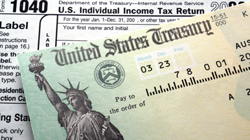Senator Stephen Sweeney said that raising taxes on millionaires in New Jersey is the “absolute last thing” that he will consider, last Thursday, Feb. 8.
Although Sweeney, the New Jersey State Senate President, long advocated for raising taxes on the wealthiest New Jersey residents; he explained that the latest federal tax overhaul changed the dynamics of taxes in the state.
“It’s the absolute last thing that I’m willing to look at,” said Sweeney, the Democratic state Senator from Gloucester, to reporters in Trenton last Thursday.
“It’s too much right now. Absolutely last resort,” he asserted. However, three months ago, when now-Governor Phil Murphy won the gubernatorial election, Sweeney tweeted that the “long overdue [millionaires’] tax” would be the first bill that the NJ Senate passes in January, after Murphy’s inauguration.
“Murphy ran on the Millionaire Tax as the face of the NJ Democratic Party,” said Ken Mitchell, Ph.D., Chair of the Department of Political Science and Sociology.
“For the Democrat Sweeney to reverse course strikes me as a move against the wishes of the voters,” Mitchell said.
Under Sweeney’s leadership in the state Senate, the Legislature passed and put a millionaires’ tax on former Governor Chris Christie’s desk five times since Christie first took office in 2010.
However, the former Republican governor vetoed the tax hike on millionaires each time.
In his final veto of the bill in 2015, Christie said that the Legislature must be “deaf and blind” to the consequences that raising taxes in New Jersey would have on the state’s economy—the highest taxed state in the country.
Sweeney explained his recent change in position; he said that the latest federal tax reform bill passed in Congress complicated matters locally in New Jersey.
 Sweeney explained that the bill, which President Donald Trump signed into law in December, added an unexpected challenge to the dynamic of taxes in New Jersey.
Sweeney explained that the bill, which President Donald Trump signed into law in December, added an unexpected challenge to the dynamic of taxes in New Jersey.
The recent federal tax law eliminates an important deduction for New Jersey residents: the state and local tax (SALT) deduction.
SALT deductions serve as tax break that help to mitigate the New Jersey’s highest-in-the-nation property taxes, as well as its cumulative personal income taxes.
In particular, the recent tax law caps the SALT deduction at $10,000 for property taxes and state income taxes combined, a threshold that many residents in the state easily exceed.
For example, the Tax Foundation reported that in 2015, New Jersey taxpayers paid an average of $17,850 in state and local taxes; and the average property tax bill in New Jersey for the year 2016 was $8,549.
In order to counter the financial burden from the capped deduction, Murphy has embraced the idea of allowing local property taxes to be paid to towns as a charitable donation, which are still deductible under the federal tax law.
However, Peter Reinhart, Esq., Director of the Kislak Real Estate Institute and a professor of real estate policy, explained why such an alternative might not pass legal obligations.
“In order to claim a deduction as a charitable donation, the taxpayer must not receive any legal benefit. Obviously, a homeowner does get a benefit by not having to pay property taxes,” he said.
Accordingly, Sweeney fears that raising taxes on the wealthiest New Jerseyans would drive them out of the state—an outcome that its economy cannot afford.
Indeed, “there has been a growing exodus of wealthier taxpayers slowing leaving New Jersey for lower tax states,” Reinhart noted.
“Before we talk about raising any taxes, we have to talk about the cost of government,” Sweeney told NJ Advance Media this week.
“What Trump did to New Jersey made me do a complete about-face and say, hold up. I am not rushing to do taxes. I’m not [going to] run in and do something [that will] cause even more problems for the [state’s] economy,” he added.
Mitchell explained that he believes it is time to rethink Sweeney’s narrative that taxing wealthy New Jersey residents would force them to migrate out of the state.
“Property values continue to rise across the state, suggesting that the demand for houses is strong; it’s a question of supply and demand,” Mitchell said.
“If rich people decide to leave New Jersey for Florida or Pennsylvania, one hopes that they will sell their home—in order to avoid the high property tax bill,” said Mitchell. “The line of younger families who are interested in purchasing homes is long.”
Currently, New Jersey’s top state income rate is at 8.97 percent on those with an income over $500,000. However, the proposed millionaires’ tax would create a new bracket for those, making an income over $1 million, which would be taxed at 10.75 percent.
During his 2017 gubernatorial campaign, Murphy endorsed the millionaires’ tax, which he is counting on in order to raise $600 million in new tax revenue in order to fund major campaign promises.
Among those campaign promises, Murphy advocated for things such as fully funding K-12 public education and government worker pensions.
However, Sweeney’s latest turnaround on the millionaires’ tax challenges Murphy’s proposed funding.
Nevertheless, Murphy still stands by his call for higher taxes on residents making more than $1 million annually in the state.
Although, the governor needs the state Legislature, under the leadership of Sweeney, in order to pass the proposal before he can sign it into law.
Reinhart notes that Sweeney has shifted from advocating for tax increases to instead focusing on reducing the cost of government.
As such, Reinhart also explained that many people are questioning whether the consolidation of municipalities and school districts should be considered in order to reduce the state government’s spending.
For example, “there are 600 school districts, each with a superintendent, even if there are only one or two school buildings in the school district,” Reinhart said.
However, he said that consolidating school districts and municipalities is “very controversial” because the people in those municipalities “will not want to give up ‘their’ town or school.”
Mitchell suggests that New Jersey “rethinks” the way in which it taxes its resident. In particular, he suggests a tax model similar to that in European countries: shifting the taxation to the sales tax rate.
“Property taxes push people out of the state far more than income taxes do,” he said.
Accordingly, Mitchell suggests cutting the state’s property taxes and compensating the difference by enacting the millionaires’ tax and higher sales taxes.
“The millionaires’ tax hits the wealthy more than it does the poor [and] lower property taxes, in particular, would aid the middle class,” he explained.
However, an increase to higher state-wide sales tax would be entirely regressive.
“A state-wide sales tax hits the poor more than it does the wealthy,” Mitchell noted.
State Senator Richard Codey (D-Essex), a former governor of New Jersey and an ally to Murphy, said that there is still support for the millionaires’ tax in the state Senate—despite Sweeney’s disapproval.
“The only people affected would be people who make a million dollars a year, and the tax only starts on the first penny after a million dollars,” Codey said to reporters last week.
Moreover, a recent 2017 Quinnipiac University poll found that seven in ten New Jersey voters were in favor of raising taxes on those with income over $1 million in order to raise the cash needed for funding the public pension system.
“I think [the millionaires’ tax is] a logical step,” Ralph Caputo, a Democratic state Assemblyman from Essex, told reporters in Trenton last week, “I didn’t see anybody drop dead when we had the millionaires’ tax in effect when Christie came into office,” Caputo added.
IMAGE TAKEN from USAToday
IMAGE TAKEN from SenateNJ.com


